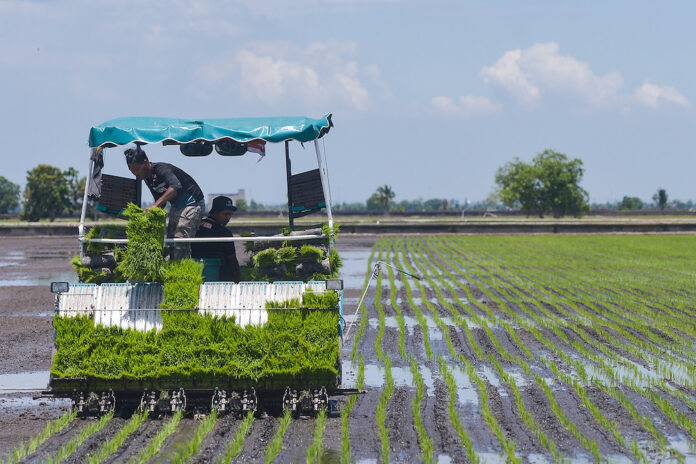Farmers are seen working on a field in Sekinchan September 4, 2021. — Picture by Miera Zulyana
KUALA LUMPUR, Oct 25 — Modernisation and smart agriculture are the key game changers for the transformation of the country’s agrofood sector under the National Agrofood Policy 2021-2030 (DAN 2.0), according to Prime Minister Datuk Seri Ismail Sabri Yaakob.
He said the two strategies would be supported by financing funds, investment incentives and manpower to increase the adoption of the fourth industrial revolution (IR4.0) technologies.
“Research and development, as well as commercialisation and innovation, will be the pulse of the development of this (agrofood) sector.
“As such, cooperation with various government research agencies, public and private institutions of higher education, will be forged to ensure the success of DAN 2.0,” he said in a recorded speech at the launch of the policy here today.
Ismail Sabri said DAN 2.0, which the implementation period is in line with the Sustainable Development Agenda, aimed to continue the development agenda of the national agrofood sector with a particular emphasis to be given on efforts to improve the country’s food security.
“The priority of this policy is on efforts to improve productivity and income as well as the quality of life of the producers in the food sector,” he said, adding that smart agriculture is also one of the Key Economic Growth Activities outlined in the Shared Prosperity Vision 2030.
Ismail Sabri said he had also tabled the focus of the transformation on the national food system which will be implemented through DAN 2.0 at the United Nations Food Systems Summit on Sept 23.
The prime minister said the country’s agrofood sector had gone through several transformation processes and after 64 years of independence, it had never been sidelined in any of the country’s development, but rather being given more and more attention.
“In 1974 for instance, the government introduced the Green Book Programme aimed at reducing the country’s dependence on food imports. This effort has continued from year to year in an organised manner.
“This includes the formulation of the National Agrofood Policy 2011-2020 (DAN) aimed at ensuring adequate food supply and safety, and to develop a competitive and sustainable agrofood sector,” he said.
Meanwhile, Ismail Sabri stressed that the country’s food system should also be further strengthened to be more resilient and sustainable, especially in preparation for any possible global crisis in the future, other than the Covid-19 pandemic.
He said this includes improving network performance in all activities related to food production, processing, distribution, preparation and safety.
The prime minister said through the DAN 2.0 framework and action plan document in place, the average annual growth of the agrofood sector is expected to be at 4.5 per cent during the 12th Malaysia Plan period.
On the first edition of DAN, he said it had undeniably shown a commendable performance as the agrofood sector’s contribution to the country’s Gross Domestic Product (GDP) had increased with an average annual growth of 6.8 per cent in 2020, an increase of almost 100 per cent over the GDP growth in 2020.
“Total food exports had also increased with an average annual growth of 6.4 per cent from RM18.1 billion to RM33.7 billion for the same period.
“Indeed, today’s agrofood sector had an added value that had the potential to increase the income of the participants in the supply chain. In order to continue the success of DAN launched in 2011, the DAN 2.0 is unveiled today,” he added. — Bernama


